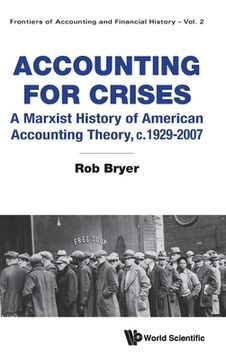Accounting for Crises: A Marxist History of American Accounting Theory, C.1929-2007
Synopsis "Accounting for Crises: A Marxist History of American Accounting Theory, C.1929-2007"
Historians have not convincingly explained modern capitalism's two major economic crises, the Great Depression of the 1930s, and the Global Financial Crisis (GFC) of 2008-2009. Accounting for Crises offers a new explanation, why both began and were more severe in the USA ('America'), based on an accounting interpretation of Marx's theory of crises. It explains their origins in capitalists' control of accumulation, which reveals important overlooked roles for Irving Fisher's accounting theory. This theory, by allowing discretion in accounts, in the context of falling rates of profit, encouraged 'swindling', overstating reported profits, and understating their risk, which facilitated and aggravated both crises. Framed by Fisher's theory, during the 1920s American accounting theorists justified discretion, which Creating the 'Big Mess' (the companion volume) concluded it management used to conservatively smooth earnings. Accounting for Crises shows that Fisher's theory, also underlays the popular new theory of investment that justified valuing shares using reported earnings, which encouraged their manipulation and legitimized 'speculation'. This, it argues, underlays America's exceptional late-1920s stock market boom, the 1929 Great Crash, and the depth and length of its Great Depression. Prominently associated with the boom, Fisher became unpopular after the crash, his name disappearing from public debate. Nevertheless, the book concludes, his theory hindered economic recovery, weakened 1930s reforms, undermined accounting regulation from the late-1930s, and following his rehabilitation from the late-1950s, underlies the Financial Accounting Standards Board's conceptual framework, which by allowing off-balance-sheet accounting for securitization-SPEs, fostered the 2007 'credit crunch' that triggered the 2008-2009 Global Financial Crisis (GFC).

